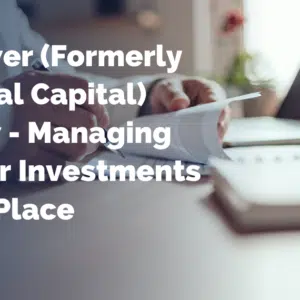I was asked a question the other day that really got me thinking. A client asked me,
“Jeff, what is the best financial advice that you have ever received in your lifetime?”
I really had to take a moment and really think about all the information I have got, all the tips, and all the advice I have gotten over the years; what is the absolute best advice? I honestly couldn’t answer that question immediately. I thought I had a few ideas, but I really wanted to take a breath and just really see what some of the best advice I ever got.
The one thing, if this is your first time ever hearing me talk or if you haven’t been to the blog yet to know a little bit about my back story, my family, my father, and my mother, they didn’t really give me a lot of good financial advice. They always said maybe you should save, but they never really showed me how or never really introduced me to a lot of cool tools like the Roth IRA that I could save into. The best financial advice I have received has been from my clients, through the experiences that they have gone through, the trials and tribulations of their financial rights and wrongs.
What they passed down to me is where that advice has come from. I can think of a few different things as some of the best financial advice I have ever received.
Just Start!
The first thing is you should start saving earlier. Duh, right! I know that’s not rocket science. It’s not some great revelation. I have met with so many different folks who were in their late 50s, maybe early 60s, who were approaching retirement and weren’t as comfortable or confident as they would like to have been.
Had they started saving earlier, they felt that they would be much more comfortable going into retirement with a really good strong feeling about it, and they didn’t have it. They wished they would have started earlier. What such tremendous advice for me, at the time in my mid-to-younger 20s, to get that, because if my parents were telling me you need to save early, you need to start, you need to start, which they didn’t, but even if they had I don’t know if I really would’ve listened.
Now, being in my 20s, starting my career, and sitting across the table from folks who didn’t listen to the advice maybe that their parents had passed down to them, they are paying the consequences.
Do You Really Need to Buy <Fill in The Blank>
To go along with that, as far as starting earlier, the other thing that they taught me or some of the other advice that I got was you need to save more. Once again, this isn’t some epiphany like, “Oh wow! Thanks Jeff. That really helped out a lot.” It helped a lot hearing it coming out of their mouth, saying, “Jeff, trust me.
Earn Baby Earn
I think the other aspect is trying to earn more. It’s always about saving, but it’s also trying to earn more. That’s you getting raises at your job. That’s maybe doing freelance work. That’s working a part-time job maybe from home. Maybe it’s a side passion of yours to basically try to earn more income.
That’s something that I have kind of adopted. I do save. I did start early. I do save often, but I have also tried to find other ways to increase my income. I think there is a delicate balance.
Saving is a good thing, but if you can make more, it makes it that much easier to save. That could be choosing a different career path. If that’s not in your blood, then maybe it’s doing a side job.
I have a lot of clients that will do maybe freelance writing or photography or anything for that matter just to basically have some extra income as well.
The “Lu”
The third and final thing is that if you go to my other blog, Soldier of Finance, I actually wrote an article about it. I talk about the “Lu,” which is the 1998 Chevy Lumina that I drove whenever I was in college and then also drove for my first several years of working. This was a car that was passed down from my now-deceased grandmother.
It was champagne colored, had alloy wheels, four doors, no spoiler, and had a cassette player. This thing was sharp, right? You can imagine driving around town in a four-door Lumina.
A few things about it, though: It had about 12,000 miles on it, and I think I got it from her back in 2002, maybe earlier, I believe. It was a car that was four years old, maybe a little bit older than that, actually, and it only had 12,000 miles on it. So that was one aspect of it.
The other aspect of it: It was paid off, so I had no car payment. But here’s the thing. If it hadn’t been for a finance professor in college, the “Lu” wouldn’t be such a success story.
The professor, on the first day of class, asked us, “How many of you plan on trading in your car every 3-5 years?” I want to say all of us, maybe with the exception of two, and you have a class of 30 folks or so, all of us raised our hand. I remember at the time, I had this big vision of driving a BMW. I am not sure why that was, but I just envisioned myself driving a BMW.
Once I graduated, that was my car, a four-door sports sedan; that’s what I wanted. I knew once I graduated, I didn’t care how much I was going to make. I was going to find a way to get that BMW.
When he asked us that question, we all raised our hand, and he responded, “While all of you are trading in your car every 3-5 years, I’ll be taking my family overseas on European vacations.” When he said that, I thought, “What does that mean? What are you talking about?”
That was our introduction to the power of compounding interest and how saving an amount of money today and what it can grow to be. It showed by putting in a car payment per month, whether it be $300, $400, $500, or $600 a month, what that can grow to be. For me, as a young male who had these big aspirations of driving this sport luxury foreign car, I was like, “Wow! What am I doing? What am I thinking? I’m going to be wasting money when I could actually be saving?”
That was extremely helpful to me and some of the best I ever got because whenever I inherited that Lumina, I had the option of trading it in or selling it, getting the cash, and applying it towards the BMW. I still would have had a car payment, but I would have been driving my dream car. Instead, I drove the Lumina for almost three or four years up until I returned from Iraq, and I didn’t have a car payment that whole time.
Not having that car payment gave me the ability to be able to save my 401(k) into my Roth IRA. It made me appreciate the fact of how to spread a dollar, not go out and waste money on just useless things. That was a huge pivotal point in my life because now I reflect back.
Because I didn’t have that car payment for those years, I’ve got a decent amount socked away in my retirement accounts that have been able to grow over the last few years. I am glad that I received it. I’m glad that I applied it, and any chance I get to share that story with others as I’m doing now, I look forward to it and hope that you get something out of it as well.
What’s Your Best Financial Advice?
Those are three of some of the best financial tips I have received over the years. I hope that was helpful. I’m curious as far as with you, what is some of the best financial advice that you’ve received in your life? Be sure to share your stories and comments so that others may benefit.








Great advice Jeff. I agree with all the aspects behind these financial ideas. I have not had a car payment now for over 3 years and I started my Roth IRA at 19. Talk to you soon.
The best financial advice I ever received was that all those toys you see your friends have such as large ski boats, four wheelers, motor homes, etc. are not really assets. They are more like liabilities for they cost plenty to keep and maintain. At times I didn’t listen and thought I had to have such toys but I soon realized the fact that such toys are not necessary for a fun filled life.
Instead of buying all of these toys, I began to invest my extra funds but then I didn’t know what to invest in. Not until many years later and several losses in investing in stocks did I finally feel like I somewhat knew how to invest.
I own a home but I was cautious to not buy too big of a home. My friends still are paying for their overly extravagant homes while I am debt free. Also, when I purchase a car I expect to drive it for up to 10 years.
I have never felt that I needed the latest gadgets or the biggest toy. Now that I have retired, my wife and I are comfortable and are almost worry free for having sufficient funds with which to live on. I sometimes think it doesn’t matter how financially secure I may be, I still have a little worry about the future. Especially in today’s world. I have been most fortunate and always thank my parents and grand parents for all the hard work and sacrifices they made. Without them, I may not have had the opportunities in life that I have had.
Obviously, the financial advice of spending less than you earn and compound interest are extremely important. Other than those, I think the best financial advice I received was to save for specific time periods. Short term or 0 to 10 years, mid-term or 10 to 20 years, retirement, and any other time periods you want to specify. Even though I don’t know exactly what I will be using the money for in 10 to 20 years, I will be extremely thankful that it is there when the time comes.